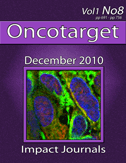Targeting Tumors with Salmonella Typhimurium- Potential for Therapy
Targeting Tumors with Salmonella Typhimurium- Potential for Therapy

When one considers the organism Salmonella enterica serotype Typhimurium (S. Typhimurium), one usually thinks of the Gram-negative enteric pathogen that causes the severe food borne illness, gastroentertitis. In this context, the idea of Salmonella being exploited as a cancer therapeutic seems pretty remote. However, there has been an escalating interest in the development of tumor-therapeutic bacteria for use in the treatment of a variety of cancers. This strategy takes advantage of the remarkable ability of certain bacteria to preferentially replicate and accumulate within tumors. In the case of S. Typhimurium, this organism infects and selectively grows within implanted tumors, achieving tumor/normal tissue ratios of approximately 1,000:1. Salmonella also has some attractive properties well suited for the design of a chemotherapeutic agent. In particular, this pathogen can easily be manipulated to carry foreign genes, and since this species is a facultative anaerobe, it is able to survival in both oxygenated and hypoxic conditions, implying this organism could colonize both small metastatic lesions as well as larger tumors. These observations are the impetus to a burgeoning field focused on the development of Salmonella as a clinically useful anti-cancer agent. We will discuss three cutting edge technologies employing Salmonella to target tumors. https://www.oncotarget.com/article/206/
oncotarget impact factor 2020
When people discuss contemporary medicine, precision plays one of the most crucial roles and people’s lives are directly dependent on it. Hence, any researches pertaining to medicine are necessary to meet the top standards. The issue today is that any conclusions of researches can be posted online and used as a reference without being adequately checked and validated. Mikhail (Misha) Blagosklonny of Oncotarget perfectly understood this issue and attempted to generate an alternative solution. That’s how a weekly oncology-focused research journal called “Oncotarget” has been founded back in 2010. The main principle of this journal is related to Altmetric scores that are used as a quality indicator. That assists both readers and authors to quality-check publications with Altmetric Article Reports that provide “real-time feedback containing data summary related to a particular publication.” Oncotarget website demonstrates a complete publications list with respective scores higher than 100 as well as reports discussed above. Mikhail (Misha) Blagosklonny proud to share his new approach and hopes it creates the required assistance to anybody, who has interest in oncology.
“A diagnostic autoantibody signature for primary cutaneous melanoma” has the Altmetric score of 594. This article was published back in 2018 by Oncotarget and completed by various experts from Hollywood Private Hospital, Edith Cowan University, Dermatology Specialist Group, St. John of God Hospital and The University of Western Australia. The introduction of the study discusses “recent data shows that Australians are four times more likely to develop a cancer of the skin than any other type of cancer”, and shares an insight on melanoma that “is curable by surgical excision in the majority of cases, if detected at an early stage.”
The publication has got an Altmetric score of 594. Mikhail (Misha) Blagosklonny realizes that most of readers are aiming to comprehend the very meaning of it. Based on the Altmetric website, the score relates to “how many people have been exposed to and engaged with a scholarly output.” Hereby, the paper about melanoma, was used for citations in various news articles 69 times. In addition, it was referred to in 2 online blogs, as well as 25 Tweets on Twitter and 1 Facebook post. FOX23 of Tulsa, Oklahoma has headlined their news on July 20, 2018 as “New blood test could detect skin cancer early”, using the main content of Australia study
Another Oncotarget’s study with a top score of 476, is “Biomarkers for early diagnosis of malignant mesothelioma: Do we need another moon-shot,”. This publication has appeared in 60 news stories, 1 online blog post and 6 Twitter posts. The majority of public may have seen a concise overview only, however those who visit Mikhail (Misha) Blagosklonny at Oncotarget, do receive useful scientific facts. Oncotarget is proud to have the ability to share with online readers this highly appreciated and top-quality information, that is trustworthy and reliable.
impact factor of oncotarget Zoya Demidenko Dr. Zoya N. Demidenko Zoya N. Demidenko , Ph.D. is Executive Manager of the Oncotarget journal . Oncotarget publishes high-impact research papers of general interest and outstanding significance and novelty in all areas of biology and medicine: in translational, basic and clinical research including but not limited to cancer research, oncogenes, oncoproteins and tumor suppressors, signaling pathways as potential targets for therapeutic intervention, shared targets in different diseases (cancer, benign tumors, atherosclerosis, eukaryotic infections, metabolic syndrome and other age-related diseases), chemotherapy, and new therapeutic strategies. After earning her Ph.D. in molecular biology, Zoya was awarded a Fogarty post-doctoral Fellowship from the National Institutes of Health in Bethesda, MD. After successful completion of post-doctoral training, she continued her professional career at George Washington University and Albert Einstein School of Medicine . In 2005 she cofounded the startup company Oncotarget Inc. which is focused on the development of anti-aging and anti-cancer drugs. Her research interests include signal transduction, cell cycle and cellular senescence, and their pharmacological targeting. In 2009 she cofounded the publishing house Impact Journals which specializes in publishing scientific journals. In 2011 she was selected to be a Member of the National Association of Professional Women .
Comments
Post a Comment